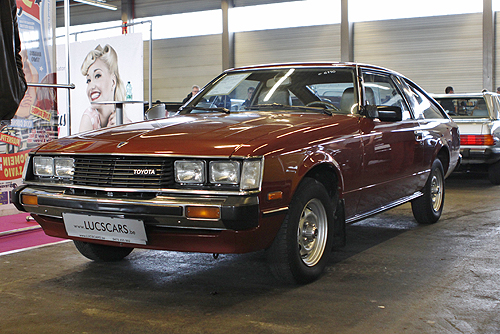| Autofabrikant : | Toyota |
| Land : | Japan |
| Fabriek : | Aichi |
| Aantal : | |
| Productiejaren : | 1977 - 1981 |
| Opvolger van : | |
| Type : | |
| Uitvoeringen : | 2 d convertible, coupé, 3 d liftback |
| Motoren : | 1.588 cc - 2.400 cc / I4 |
| Max. snelheid : | |
| Plaats van foto : | Flanders Collection Car Gent - 2015 Oost Vlaanderen - België |
| Datum foto : | 21 februari 2015 |

The second-generation Celica was released for 1978 model year (production began in late 1977), and was again available in both Coupe and Liftback forms. Interestingly, it was designed in the United States by Toyota's Calty Research Design studio in California. The Coupe was no longer a true hardtop; both Coupe and Liftback had frameless door glass but featured a thick "B" pillar. David Stollery was responsible for its design.
From 1979 to 1981 the Griffith company in the US offered a Targa style convertible conversion to the Coupe. They were called the SunChaser and had a removable Targa top and a folding rear roof, much like the '67 Porsche 911 soft-window Targa. These were Toyota approved and sold through Toyota dealers.
The second-generation Celica can also be broken down into two series of release (known as Series A and Series B). These two Celicas were only distinguishable by appearance – both having the same engine capacity. The original Series A Celica (1978–1979) was released with round headlights and chrome bumpers for lower grades. The higher grades such as GT and all US models have black rubber bumpers. The facelift model Series B Celica (1979–1981) was released with square headlights, revised tail lights. They came with chrome bumpers with rubber protectors on each corners, or for certain models with all polyurethane black bumpers such on the GT and all US spec cars.